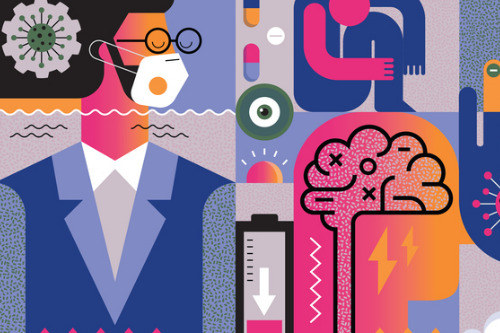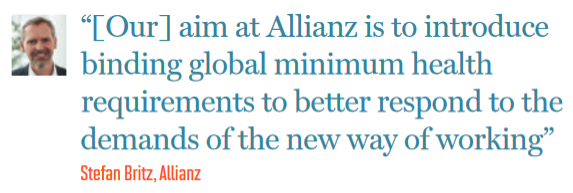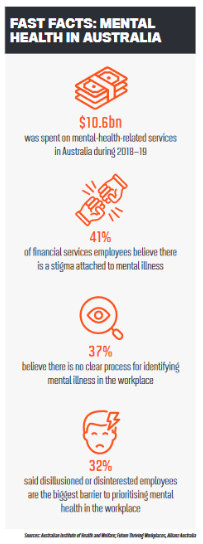

Mental wellbeing in the insurance industry has taken on a new urgency over the last year. A recent report from the World Health Organisation revealed that the COVID-19 pandemic has disrupted crucial mental health services in 93% of countries worldwide – at the same time that demand for these services is spiking. The crisis is also shining a spotlight on the need for organisa-tions to really consider the pressing issue of mental wellbeing.

There is no doubt that the pandemic has massively influenced awareness around how important mental health is, says Natasha Gill, head of human resources for reinsur-ance at Swiss Re, who adds that it’s a posi-tive sign that mental health is increasingly becoming part of the conversation. This is needed to help break the stigma histori-cally attached to mental health issues, thus encouraging people to seek help as early as possible.
“We do see that multiple factors have contributed to a decline in mental health,” Gill says. “Post-traumatic stress syndromes are on the rise. People fear for their health, their families and livelihood. The measures taken to prevent the virus from spreading forced people into isolation and put addi-tional burdens on those who had to juggle home, office and family duties.”
The pandemic has shown everyone how dramatically our lives can change overnight, says Stefan Britz, chief human resources officer at Allianz. From remote working to homeschooling and social distancing, pandemic-mandated processes are having a significant impact on the psyche of those affected. As an employer, Britz says, Allianz is now being asked more than ever to provide employees with the best possible support.
Beyond the clear social responsibility companies have to protect the wellbeing of their staff, the economic cost of mental health to organisations is substantial. The latest Lancet Commission report on mental health estimates that 12bn working days are lost due to mental illness every year, while mental disorders are projected to cost the global economy $16trn by 2030.
“We are working assiduously to support the mental health and wellbeing of our employees in the current situation,” Britz says. “To this end, [we] have defined a global framework that includes the dimensions of mental and physical resilience, motivation and engagement, and work effectiveness. [Our] aim at Allianz is to introduce binding global minimum health requirements to better respond to the demands of the new way of working and to adapt global and local health initiatives to the new normal.”
Gill says that by acknowledging how COVID-19 has forced the evolution of working patterns, Swiss Re has been able to implement a variety of innovative wellbeing solutions. The reinsurer recently celebrated Swiss ReSilience Day, an additional free day of annual leave to thank its staff for their hard work in 2020. In addition, Swiss Re’s getTOGETHER initiative over the holiday season encouraged staff to reach out to each other or local charities in a bid to ensure no one had to spend time alone unwillingly.
“I can positively say that Swiss Re has done a lot to support the wellbeing of our people,” Gill says. “We know that we can’t expect our people to live up to our vision of making the world more resilient without being resilient on a personal level first.”

A common theme in the approaches taken by Swiss Re and Allianz is the use of data, such as that gathered from employee surveys, to get a pulse on the wellbeing of their people. Britz says Allianz uses an annual employee survey to monitor its Work Well Index Plus (WWi+), which measures the success of all health and wellbeing initiatives. Over the last three years, this score has improved from 64% to 70%, he says, signalling that Allianz is on the right path. 
A key takeaway from both companies’ success in protecting the mental wellbeing of their employees is that many of their initiatives have not been precipitated by the current crisis. The speed and breadth of their COVID-19 response, therefore, was facilitated by the structures they had in place prior to the pandemic.
But as the saying goes, while the best time to plant a tree is 20 years ago, the second best time is now. Mental wellbeing considerations are more important than ever, Gill says, adding that companies that create an environment of inclusion and psycho-logical safety – and understand that mental resilience is key to a healthy performance culture – will win in the long run.
“It will be a differentiator in attracting talent and key for people to bring the best version of themselves to work,” she says. “And frankly, who wouldn’t want to work in a company that is human-centred?”
